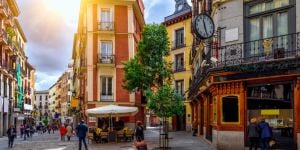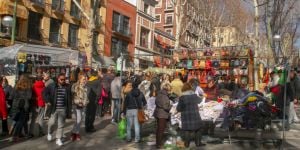
Madrid is a hub of culture, politics, industry and innovation and one of Europe's leading financial centers. This thriving metropolitan city is also a great place to study, with its many universities offering study programs across hundreds of disciplines.
Important:
When planning to study abroad in Spain, be sure to read more about formalities and applying for a student visa.
Why study in Madrid?
Here are some of the reasons why you should consider studying in the Spanish capital:
Madrid attracts a lot of foreign investment and is an important center for business and commerce, which means there are plenty of business and work opportunities.
The city offers access to world-leading training in research, technology and innovation. Many educational institutions are recognized worldwide.
The Times Higher Education World University Rankings 2025 uses 18 performance indicators to rank more than 2,000 institutions universities from 115 countries and territories. Madrid universities achieved the following positions:
- Autonomous University of Madrid - #351 - 400;
- Complutense University of Madrid - #501 - 600;
- Carlos III University of Madrid - #801 - 1000;
- European University of Madrid - #1001 - 1200;
- Technical University of Madrid - #1001 - 1200;
Madrid is a student-friendly city and boasts many discounted facilities for those undertaking education at its universities. They include museums, galleries and public transportation.
As people from all over the world come to live, work and study in Madrid, you'll be exposed to numerous cultures, not just Spanish.
You'll have lots of opportunities to learn Spanish as you immerse yourself in life in the city and make friends. Spanish is one of the world's most spoken languages, and you can choose whether to study in Spanish or English in some institutions.
There is good year-round weather. The climate may not be a top reason for choosing a study destination, but it can make a massive difference to your quality of life. Living in one of the country's sunniest cities with very little rain will do a lot to boost your morale, not to mention keeping your body topped up with vitamin D.
Madrid is a reasonably affordable city. While rental and property prices can be on the expensive side, other cost of living prices are very affordable. For example:
- The average price of a meal in an inexpensive restaurant is 15 euros;
- The average price of a 0.33-liter bottle of fizzy drink is around 2.59 euros;
- A liter of milk is about 1 euro;
- One kilogram of local cheese averages 12 euros;
- One kilogram of apples averages 2.20 euros.
Good to know:
While many courses are in Spanish, more and more undergraduate and post-graduate programs are offered in English each year. Many universities offer intensive preparatory courses if you need to brush up on Spanish.
Madrid universities
One of the most important questions you will ask yourself when coming to live and study in Madrid is: which university should I choose? The country's capital has many study opportunities, including public universities, private universities, specialized academies, and business schools. Here is a closer look at some of the options.
Private universities in Madrid
Alfonso X El Sabio University: The university was founded in the 1990s, and its campus is located in Villanueva de la Cañada, a few kilometers from the center of Madrid. It offers degree and double degree programs and a catalog of training and expert courses. The university's facilities include research labs, sports centers and health centers.
Camilo José Cela University: This university was established in 2000 and is spread across four faculties, several study centers and schools and a computing and artificial intelligence lab. They offer a range of Spanish and European official undergraduate and graduate programs.
CEU San Pablo University: This Catholic university offers degrees in economics, business, communication, and humanities. It offers undergraduate degrees taught in English or bilingual and has more than 9,000 agreements with companies and institutions to carry out national and international internships.
Francisco de Vitoria University: This Catholic university is located in Pozuelo de Alarcón, in the Community of Madrid, and was founded in 1993. It has six faculties that include: The Faculty of Education and Psychology and The Faculty of Health Sciences.
Nebrija University: This private university has been operating since 1995 and offers courses in languages and education, health sciences, life and natural sciences, communication and arts and more.
Pontificia Comillas University: This Catholic university has more than 100 years of educational experience and is home to the Catholic Institute of Business Administration (ICADE) and the Catholic Institute for Arts and Industry (ICAI). They partner with dozens of academic institutions to offer academic exchange programs and work practice projects.
Universidad a Distancia: This distance-learning university opened in 2008 and offers degrees in various areas, such as social sciences and economics, as well as specialty language programs. All courses are 100% online.
Universidad Europea: This private university has Madrid campuses in Villaviciosa and Alcobendas and offers bilingual or 100% English campus-based or online programs.
Saint Louis University: This American university in Spain was founded in the 1960s and is home to students from Spain, the USA and more than 65 other countries. There are 22 fully accredited undergraduate majors and two graduate degrees. Additionally, more than 200 study abroad in Spain courses are offered every semester. Among the majors are Art History, Communication, Marketing, Philosophy, Spanish and Computer Science. The graduate programs include Political Science and Public Affairs and Spanish.
Public universities in Madrid
Alcalá University: This renowned institution was formed in 1293 and is one of the oldest universities in Europe. It is located in the historic city of Alcalá de Henares, around 40 kilometers from Madrid and has more than 29,000 students on its range of postgraduate and continuing education courses and more than 38 official degree courses. There are three campuses - the Historical, the Science and Technology and the Guadalajara campuses.
Charles III University of Madrid: UC3M was established in 1989 and provides degree, masters, continuing education, PhD and online programs. Among the university's facilities are a sports centre, an auditorium, a courtroom, television and recording studios, laboratories, libraries and workshops.
Universidad Politécnica de Madrid: The largest Spanish technological university hosts more than 36,000 students who specialize in engineering, fashion design, sports sciences, architecture and more. The university was founded in 1971 and is located in the Greater Madrid area.
Universidad Rey Juan Carlos: This public university is named after the former King Juan Carols I of Spain. It was founded in 1996 and offers an array of postgraduate training and continuous training. There are five campuses in the Community of Madrid: Aranjuez, Alcorcón, Fuenlabrada, Madrid (several locations) and Móstoles. Degrees are taught in social and legal sciences, health sciences, sciences, engineering and architecture and arts and humanities.
Other study programs in Spain
In addition to the universities listed above, there are several other higher education institutions in Madrid. Many foreign universities also have campuses in Madrid or offer study-abroad programs. The UniRank website has a convenient list of 75 Madrid universities and higher-education institutions.
Applying to a Madrid university
In Spain, there is no centralized system for applications, and each university sets its own requirements. Therefore, you will have to apply directly to each university. Visit their websites for details of entry requirements, the application process and the application deadlines. You may need to get your qualifications validated before they are accepted in Spain. Your prospective university will be able to advise you of whether this applies to your qualifications.
Grants in Madrid
International students in Madrid can apply for grants and other financial aid through different Spanish institutions. Santander bank, the Spanish Agency for International Development Cooperation, and the Fundación Carolina all present awards to foreigners studying in Madrid. Universia has a handy list that will help get you started with your grant search. Your prospective university may also have a list of funding organizations you can apply to for financial assistance.
Living in Madrid as an international student
Once in Madrid, try not to stay in a bubble of people from your own country. Put yourself out there and widen your social circle by attending university and city events. There are lots of ways to meet the locals and improve your Spanish at the same time.
Arrange your accommodation before you come to Madrid. You may decide to stay in university halls of residence, opt for flat sharing, reside with a Spanish family, or rent your own place. Look at property portals and classified ads online and contact your university to enquire about accommodation.
It is a good idea to sort out your finances before you leave for Madrid. This may not be the most exciting thing to do in the world, but it will help you with the coming academic year. Also, explore ways you can save money as a student, such as by being smart with food shopping, using credit cards wisely and gathering as much information as you can about student discounts and special offers.
Learn to cook. Ask for advice on how to cook your favorite meals before you leave home. You'll be glad once you do because not only will you be able to enjoy the tasty food you love, but cooking for yourself is a lot cheaper than eating out and ordering takeaways all the time.
Decide what stuff to take with you. The temptation can be to bring everything with you, including the kitchen sink. However, your accommodation may already provide much of what you will need, such as a microwave, toaster and kettle. Check ahead of time so you don't overpack.
Connect with your university online. If you haven't already done so, follow your university's social media accounts. Doing so will keep you up to date on what's going on, plus you'll start to feel part of the community before you arrive.
Useful links:
We do our best to provide accurate and up to date information. However, if you have noticed any inaccuracies in this article, please let us know in the comments section below.








